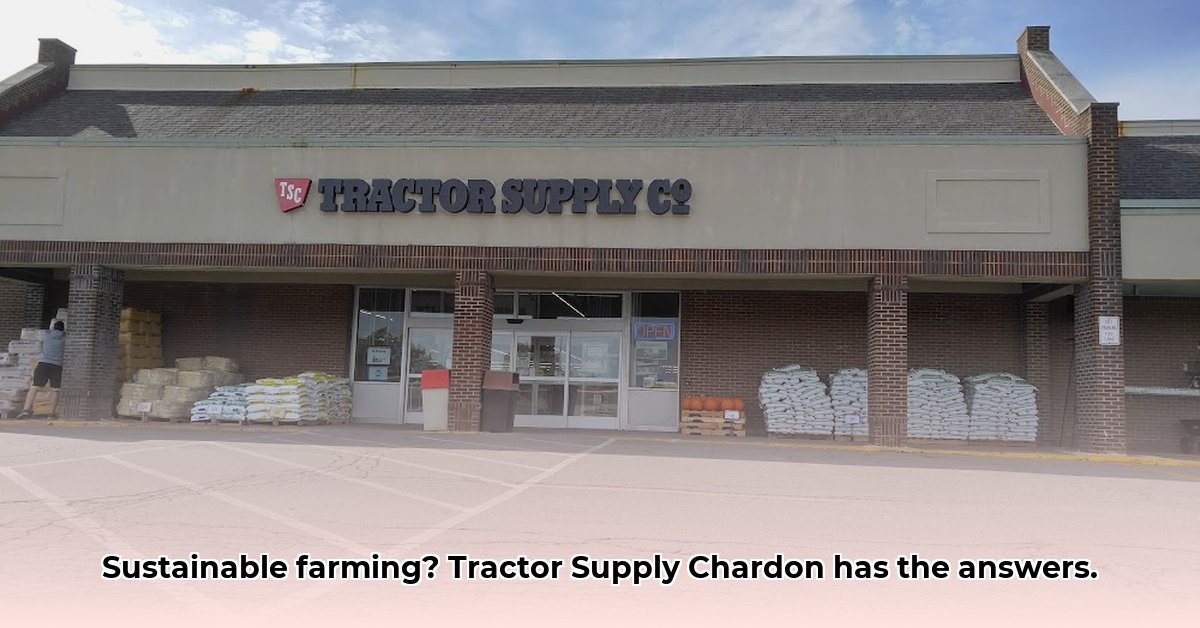
Tractor Supply Company Chardon Ohio: Sustainable Farming Solutions
Tractor Supply (TSC), a major rural retailer, plays a significant, albeit nuanced, role in the Chardon, Ohio agricultural community. Its impact on sustainable farming practices extends beyond simply selling tractors and feed; it involves the availability of specific products, marketing strategies, and the overall engagement with local farmers and consumers. This article explores TSC's contribution to sustainable agriculture in Chardon, examining both its successes and limitations. For more information on raised garden beds, check out these metal raised garden beds.
A Deep Dive into Tractor Supply's Product Offerings in Chardon
The Chardon TSC store offers a broad range of products relevant to sustainable agriculture. This includes over fifty varieties of organic and non-GMO seeds, encompassing heirloom tomatoes and drought-resistant corn. Furthermore, they stock specialized livestock feed formulated to prioritize animal welfare, focusing on natural ingredients and minimizing antibiotics and growth hormones. The store also carries products promoting soil health, such as compost starters, beneficial microbes, and natural pest control options. Water-efficient irrigation systems and durable, animal-friendly fencing are also available. This diverse inventory suggests a response to the increasing demand for sustainable farming practices in the region.
But how does the actual availability of products translate to real-world impact on local farms? This requires further investigation into local farmer purchasing habits.
The Silent Sustainability Story: Marketing and Its Implications
Despite offering a substantial selection of sustainable agricultural products, TSC's marketing strategy notably lacks explicit emphasis on sustainability. This absence of overt "green" messaging raises questions. Is this a strategic decision to appeal broadly to both conventional and sustainable farmers? Or does it reflect a gap in marketing resources or market research, potentially hindering the reach of their eco-friendly offerings? This necessitates a thorough examination of TSC's internal decision-making processes and market analysis.
Does the lack of focused marketing limit the adoption of sustainable practices among local farmers? Understanding farmer awareness of TSC's sustainable product line is key to answering this question.
Chardon's Farming Landscape: Understanding the Context
Analyzing TSC's role requires understanding Chardon's broader agricultural context. Data on the prevalence of sustainable farming methods, consumer demand for organic produce, and the presence of local environmental initiatives would provide valuable insight. While precise figures are lacking, anecdotal evidence suggests a growing interest in sustainable practices among many local farmers, a trend that TSC's product offerings could indirectly support. However, a more detailed quantitative analysis is crucial for a full assessment.
What percentage of Chardon farms actively employ sustainable practices? This is a critical data point missing from the current analysis.
Multiple Perspectives: Farmers, Consumers, and Tractor Supply
TSC's influence extends beyond products, involving farmers, consumers, and the company itself. Understanding their perspectives is vital. Farmers' feedback on TSC's sustainability offerings and their overall experience informs the store's impact. Consumer demand drives product selection. Environmental groups' advocacy shapes broader awareness and expectations. TSC's responsiveness to these stakeholders' needs directly impacts the success of sustainable farming initiatives in Chardon.
“The availability of organic seed and feed at TSC is helpful, but more direct engagement with local farmers about their specific needs would be beneficial,” states Sarah Miller, owner of Miller Family Farms in Chardon.
Challenges and Opportunities: Paving the Path Forward
Several challenges hinder TSC's contribution to sustainable farming in Chardon. Low demand for niche products could discourage stocking them. Furthermore, training staff on sustainable agricultural practices would enhance their ability to advise customers. However, opportunities abound. Targeted marketing could boost awareness of sustainable products. Strengthening partnerships with local environmental organizations and educational institutions could promote best practices and strengthen community bonds. Lastly, optimizing product selection based on market research would benefit both TSC and local farmers.
Conclusion: Building a Sustainable Future in Chardon
Tractor Supply's role in supporting sustainable agriculture in Chardon is complex. While the store offers a range of relevant products, the absence of focused marketing, coupled with the need for more comprehensive data on local farming practices and consumer demand, limits a precise assessment of its overall impact. However, the potential for positive contribution is significant. Through strategic actions—including targeted marketing, staff training, and enhanced partnerships—TSC can significantly enhance its role in creating a more environmentally friendly and economically viable future for Chardon's agricultural sector. Further research and ongoing monitoring are essential to assess the long-term effects of these efforts. A follow-up study, perhaps involving a survey of local farms and consumers, is needed to measure the extent to which TSC’s efforts have influenced sustainable agriculture adoption within Chardon.
Appendix: Data Needs for Future Research
To fully evaluate Tractor Supply's impact, several key data points are needed:
- Percentage of Chardon farms utilizing sustainable practices: This would provide a baseline measure of the current state of sustainable agriculture in the region.
- Consumer demand data for organic and sustainably produced food: Understanding consumer preferences would inform product selection and marketing strategies.
- Market share analysis of sustainable agricultural products: Determining TSC's share of this market compared to competitors is essential.
- Farmer feedback on TSC's sustainable product offerings and services: This qualitative data would shed light on the practical impact of the store's offerings.
Gathering this data would create a stronger basis for a thorough analysis of TSC’s contribution to sustainable agriculture in Chardon in the future.